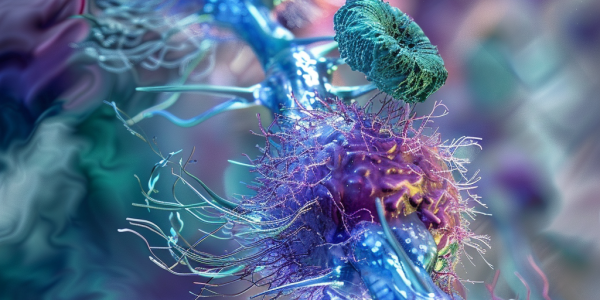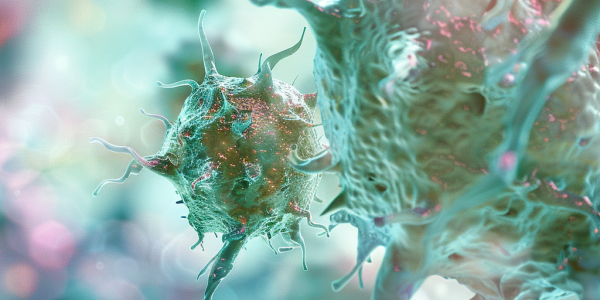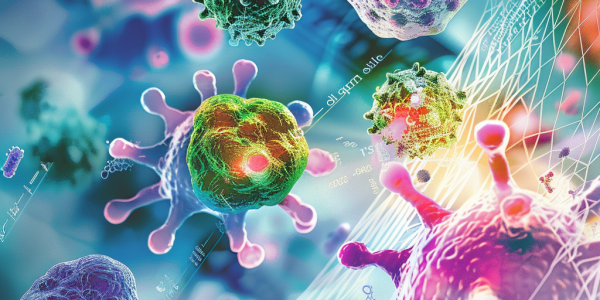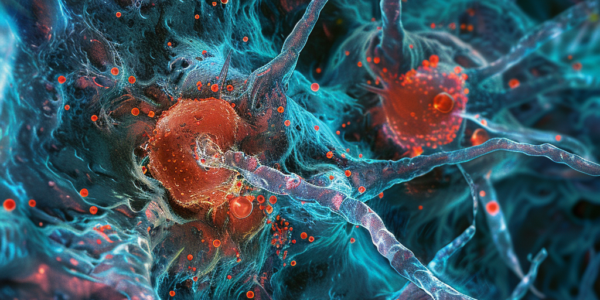Study Highlights Importance of Tertiary Lymphoid Structures in Liver Cancer Treatment
A groundbreaking study from Johns Hopkins Kimmel Cancer Center reveals that tertiary lymphoid structures (TLS) significantly enhance anti-tumor immunity in liver cancer treatment. Published in Nature Immunology, the research indicates that higher densities of TLS correlate with reduced cancer recurrence post-surgery, emphasizing their potential role in improving outcomes for patients undergoing presurgical immunotherapy for hepatocellular carcinoma (HCC).
CD8 T Cells Identified as Key Indicators in Early Multiple Sclerosis Onset
Recent research highlights the crucial role of CD8-positive T cells in the early stages of multiple sclerosis (MS). Led by PD Dr. Lisa Ann Gerdes, this study, published in Science Immunology, utilized identical twins to uncover immune cell changes that may signal MS onset. The findings suggest that alterations in CD8 T cells could serve as early indicators of the disease, paving the way for new diagnostic and therapeutic strategies. Understanding these immune responses is vital for early intervention in MS, a condition that can lead to severe neurological deficits.
Tissue-Resident Memory T Cells: Key to Improving Survival in Lung Cancer
Recent research from the Terasaki Institute reveals that tissue-resident memory T cells play a crucial role in the prognosis of non-small cell lung cancer (NSCLC). This groundbreaking study, published in Frontiers in Immunology, introduces an 18-gene risk score that predicts patient survival and aids in personalized treatment planning. By understanding the immune microenvironment, this research paves the way for improved therapies and highlights the potential of these immune cells as prognostic markers in lung cancer.
Electrical Currents Enhance NK Cell Efficacy in Cancer Treatment
A groundbreaking study published in Cell Reports Physical Science reveals that tumor treating fields (TTF) can enhance the efficacy of natural killer (NK) cells in fighting aggressive brain tumors like glioblastoma. Conducted by researchers from Trinity College Dublin and the University of Cambridge, this innovative approach shows promise in improving cancer treatment outcomes by combining electrical currents with immunotherapy. The findings suggest TTFs could serve as an effective adjunct therapy, potentially revolutionizing treatment protocols for hard-to-treat cancers.
Protein TIMP-1 Found to Enhance Immune Response to Cancer, Study Shows
Researchers at the University of Turku in Finland have discovered the crucial role of the protein TIMP-1 in the immune system’s defense against cancer. This groundbreaking study, published in Genes & Immunity, reveals how TIMP-1 enhances antitumor immunity and shows promise in improving cancer immunotherapies. Targeting TIMP-1 in tumors with weakened immune responses could lead to innovative therapeutic approaches in cancer treatment. The research also highlights the broader implications of TIMP-1 in combating infections caused by viruses and bacteria, offering new avenues for personalized treatment strategies.
Breakthrough in Cancer Research: Microbiome-Based Therapies Show Promise
A recent breakthrough in cancer research by a team from POSTECH and ImmunoBiome focuses on the use of a dietary-derived bacterial strain, IMB001, to enhance anti-tumor responses through ‘nutritional immunity’. The team’s study, published in Nature Immunology, reveals the potential of microbiome-based cancer therapies. Dr. Sin-Hyeog Im has developed a novel strategy for identifying beneficial bacteria suitable for cancer treatment, with plans to start a clinical trial in 2025. IMB001 has shown promising results in preclinical studies across various cancers, slowing down tumor progression and enhancing checkpoint inhibitor therapy efficacy.
New Menthol Derivatives Show Promise in Fighting Inflammation
Scientists have developed new compounds derived from menthol, known for its medicinal properties, to combat fat and inflammation. The study led by Professor Gen-ichiro Arimura from Tokyo University of Science discovered that menthyl esters of valine and isoleucine showed superior anti-inflammatory effects compared to menthol. Published in the Immunology journal, this research highlights the potential of these compounds in treating inflammatory conditions and opens up exciting possibilities in medicinal chemistry.
RevolKa Ltd. Partners with La Jolla Institute for Immunology to Develop Next-Generation Vaccines
RevolKa Ltd. partners with La Jolla Institute for Immunology to develop next-generation vaccines using innovative protein engineering technology aiProtein. This collaboration aims to address unmet medical needs in infectious diseases, marking a significant step towards advancing vaccine research and development.
Study Reveals Metabolic Mechanisms Behind Anti-Inflammatory Effects of Glucocorticoids
A recent study published in Nature has revealed the metabolic mechanisms behind the anti-inflammatory effects of glucocorticoids, offering potential insights for the development of new anti-inflammatory drugs. The research delves into the molecular processes through which glucocorticoids exert their anti-inflammatory properties, shedding light on the reprogramming of mitochondrial metabolism in macrophages and the enhanced production of the anti-inflammatory metabolite itaconate. These findings have far-reaching implications for the development of new anti-inflammatory drugs and could lead to more effective treatments for immune-mediated inflammatory diseases.
Researchers Discover Early Indicators of Childhood Food Allergies
Researchers at National Jewish Health have discovered early indicators of food allergies in babies as young as two months old through a noninvasive skin tape sampling method. The study, published in the Journal of Allergy & Clinical Immunology, aims to identify people at risk for food allergy and address skin barrier abnormalities early to prevent the development of these conditions.










